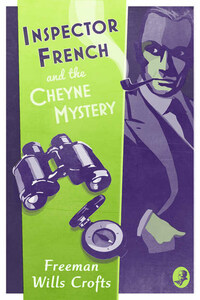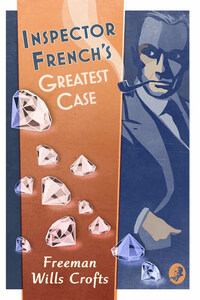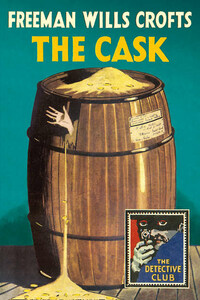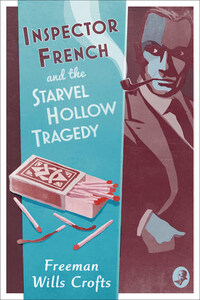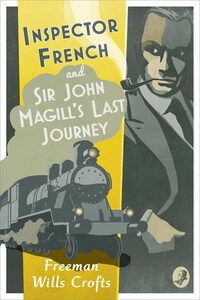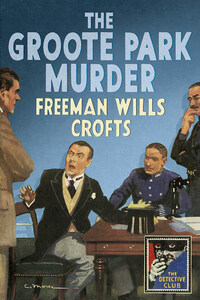Published by COLLINS CRIME CLUB
An imprint of HarperCollinsPublishers Ltd
1 London Bridge Street
London SE1 9GF
www.harpercollins.co.uk
First published in Great Britain by Wm Collins Sons & Co. Ltd 1926
Copyright © Estate of Freeman Wills Crofts 1926
Cover design by Mike Topping © HarperCollinsPublishers Ltd 2016
A catalogue copy of this book is available from the British Library.
This novel is entirely a work of fiction. The names, characters and incidents portrayed in it are the work of the authorâs imagination. Any resemblance to actual persons, living or dead, events or localities is entirely coincidental.
All rights reserved under International and Pan-American Copyright Conventions. By payment of the required fees, you have been granted the non-exclusive, non-transferable right to access and read the text of this e-book on screen. No part of this text may be reproduced, transmitted, down-loaded, decompiled, reverse engineered, or stored in or introduced into any information storage and retrieval system, in any form or by any means, whether electronic or mechanical, now known or hereinafter invented, without the express written permission of HarperCollins.
Source ISBN: 9780008190613
Ebook Edition © November 2016 ISBN: 9780008190620
Version: 2016-10-14
When the White Rabbit in Alice asked where he should begin to read the verses at the Knaveâs trial the King replied: âBegin at the beginning; go on till you come to the end; then stop.â
This would seem to be the last word on the subject of narration in general. For the novelist no dictum more entirely complete and satisfactory can be imaginedâin theory. But in practice it is hard to live up to.
Where is the beginning of a story? Where is the beginning of anything? No one knows.
When I set myself to consider the actual beginning of Maxwell Cheyneâs Adventure, I saw at once I should have to go back to Noah. Indeed I was not at all sure whether the thing could be adequately explained unless I carried back the narrative to Adam, or even further. For Cheyneâs adventure hinged not only on his own character and environment, brought about by goodness knows how many thousands of generations of ancestors, but also upon the contemporaneous history of the world, crystallised in the happening of, the Great War and all that appertained thereto.
So then, in default of the true beginning, let us commence with the character and environment of Maxwell Cheyne, following on with the strange episode which took place in the Edgecombe Hotel in Plymouth, and from which started that extraordinary series of events which I have called his Adventure.
Maxwell Cheyne was born in 1891, so that when his Adventure began in the month of March, 1920, he was just twenty-nine. His father was a navy man, commander of one of His Majestyâs smaller cruisers, and from him the boy presumably inherited his intense love of the sea and of adventure. Captain Cheyne had Irish blood in his veins and exhibited some of the characteristics of that irritating though lovable race. He was a man of brilliant attainments, resourceful, dashing, spirited and, moreover, a fine seaman, but a certain impetuosity, amounting at times to recklessness, just prevented his attaining the highest rank in his profession. In character he was as straight as a die, and kindly, generous and openhanded to a fault, but he was improvident and inclined to live too much in the present. And these characteristics were destined to affect his sonâs life, not only directly through heredity, but indirectly through environment also.
When Maxwell was nine his father died suddenly, and then it was found that the commander had been living up to his income and had made but scant provision for his widow and son and daughter. Dreams of Harrow and Cambridge had to be abandoned, and instead the boy was educated at the local grammar school, and then entered the office of a Fenchurch Street shipping firm as junior clerk.
In his twentieth year the family fortunes were again reversed. His mother came in for a legacy from an uncle, a sheep farmer in Australia. It was not a fortune, but it meant a fairly substantial competence. Mrs Cheyne bought back Warren Lodge, their old home, a small Georgian house standing in pleasant grounds on the estuary of the Dart. Maxwell thereupon threw up his job at the shipping office, followed his mother to Devonshire, and settled down to the leisurely life of a country gentleman. Among other hobbies he dabbled spasmodically in literature, producing a couple of novels, one of which was published and sold with fair success.
